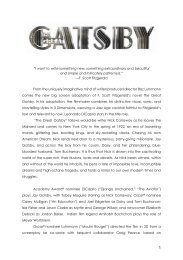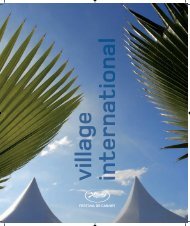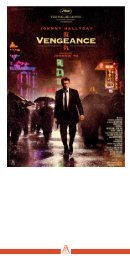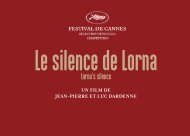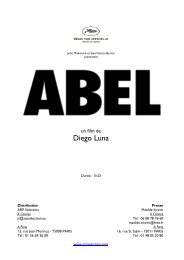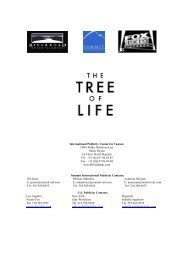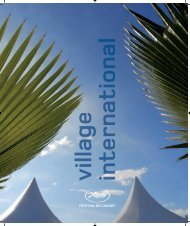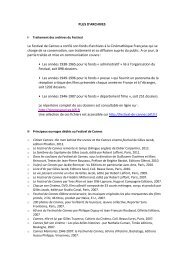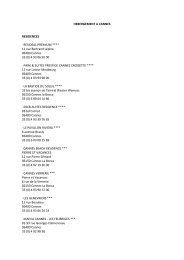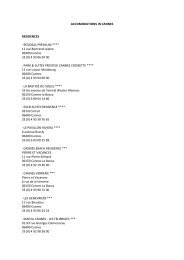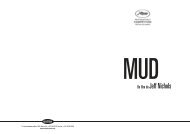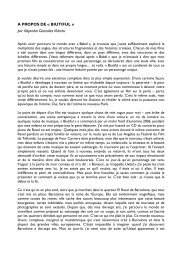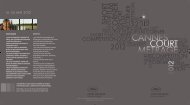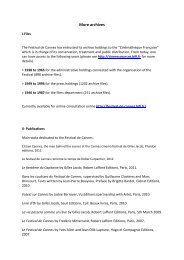(vous n'avez encore rien vu) - Sharmill Films
(vous n'avez encore rien vu) - Sharmill Films
(vous n'avez encore rien vu) - Sharmill Films
You also want an ePaper? Increase the reach of your titles
YUMPU automatically turns print PDFs into web optimized ePapers that Google loves.
Unit photography: ©arnaUd Borrel / F comme Film<br />
photography oF the recorded play: ©christophe JeaUFFroy/ F comme Film<br />
(<strong>vous</strong> n’avez <strong>encore</strong> <strong>rien</strong> <strong>vu</strong>)
INTERNATIONAL MARKETING<br />
STUDIOCANAL<br />
Emilie Martel<br />
emilie.martel@studiocanal.com<br />
French release: September 26th<br />
Runtime: 115 minutes<br />
INTERNATIONAL PRESS<br />
FILM PRESS PLUS<br />
Richard Lormand<br />
www.FilmPressPlus.com<br />
IntlPress@aol.com<br />
Phone: +33 9 7044 9865 / +33 6 2424 1654<br />
Jean-Louis Livi presents<br />
MIChEL<br />
PICCOLI<br />
MAThIEU<br />
AMALRIC<br />
PIERRE<br />
ARDITI<br />
MIChEL<br />
ROBIN<br />
JEAN-NOëL<br />
BROUTE<br />
ANDRzEJ<br />
SEwERyN<br />
(<strong>vous</strong> n’avez <strong>encore</strong> <strong>rien</strong> <strong>vu</strong>)<br />
ANNE<br />
CONSIGNy<br />
ANNy<br />
DUPEREy<br />
JEAN-ChRETIEN<br />
SIBERTIN-BLANC<br />
hIPPOLyTE<br />
GIRARDOT<br />
MIChEL<br />
VUILLERMOz<br />
LAMBERT<br />
wILSON
THE STORY<br />
From beyond the grave, celebrated playwright antoine d’anthac gathers together<br />
all his f<strong>rien</strong>ds who have appeared over the years in his play “eurydice.” these<br />
actors watch a recording of the work performed by a young acting company, la<br />
compagnie de la colombe. do love, life, death and love after death still have<br />
any place on a theater stage? it’s up to them to decide. and the surprises have<br />
only just begun...
JEAN ANOUILH<br />
Jean anouilh (1910-1987) began his career as a dramatist in 1932 and his work is<br />
still performed today. he wrote some 40 plays that he classified as “pink plays”,<br />
“Black plays”, “Brilliant plays”, “grating plays” and “Farces”. these included<br />
traveler Without luggage (1936), le Bal des voleurs (1938), eurydice (1941),<br />
antigone (1944), ring round the moon (1947), the lark (1953), Becket ou l’honneur<br />
de dieu (1959), dear antoine or the love that Failed (1969), chers Zoiseaux (1976)<br />
and le nombril (1981). his plays were directed by prominent names such as<br />
louis Jouvet, georges pitoëff, andré Barsacq, pierre Fresnay and, from the 1950s<br />
onwards, by anouilh himself, generally in collaboration with roland piétri. anouilh<br />
also directed plays by William shakespeare, heinrich von Kleist and roger Vitrac.<br />
Jean anouilh directed two films in his lifetime, le VoyageUr sans Bagage in<br />
1944 and tWo pennies Worth oF Violets in 1951, and he wrote the screenplays<br />
and dialog for many others.<br />
many of the actors appearing in this film have acted in anouilh’s plays, including<br />
sabine azéma (Waltz of the toreadors in 1973, le scénario in 1976), pierre arditi<br />
(la répétition ou l’amour puni in 1986), anny duperey (la répétition ou l’amour<br />
puni in 1986, colombe in 2011) and lambert Wilson (time remembered in 1984<br />
and eurydice in 1991).
INTERVIEW WITH ALAIN RESNAIS<br />
When did you decide to tackle an adaptation of a Jean anouilh play?<br />
When my producer, Jean-louis livi, and his associates Julie salvador and<br />
christophe Jeauffroy suggested i do a new film with them after Wild grass, we<br />
started looking for a play that would very quickly result in a script for us. in my<br />
films, i’m constantly looking for a theater-style language and musical dialog that<br />
invites the actors to get away from the realism of everyday life and move closer<br />
to a more offbeat performance. i read or reread different playwrights before<br />
i settled on Jean anouilh. since the end of the 1930s, i’ve been involved with<br />
the production of around 20 of his plays. When i came out of a production of<br />
eurydice at the théâtre de l’atelier 70 years ago, i was so emotional that i cycled<br />
right around paris, and saw the play again the following week. as i had done with<br />
Wild grass, i asked my f<strong>rien</strong>d laurent herbiet to look at adapting two works as<br />
a director. after two or three days, laurent suggested combining eurydice with<br />
dear antoine, one of anouilh’s other plays that i’d asked him to read. so for our<br />
purposes, eurydice became a play by the dramatist antoine d’anthac, an eternally<br />
dissatisfied man who lacks in self-confidence and feels unloved. antoine’s actors<br />
and f<strong>rien</strong>ds who were in the very first performance of the play, or appeared in<br />
it 10, 20 or 30 years later, then come together to watch some recordings of a<br />
young theater company who are now rehearsing eurydice, which they want to<br />
perform on stage. during the screening, antoine’s f<strong>rien</strong>ds are so overwhelmed<br />
by their memories of the play that they start performing it together, despite no<br />
longer being the appropriate age for their various roles. i still feel a very special<br />
emotion when i see a scene being performed by an actor who is taking on one
of their former roles. the challenge of the film was to sustain the drama across<br />
the back and forth between antoine’s f<strong>rien</strong>ds and the actors in the recording.<br />
and it also seemed to me to be a way to reinforce the emotion when orpheus<br />
and eurydice are reunited, these two mythological characters who have been<br />
immortalized by the power of the popular imagination and subconscious.<br />
you have cast many actors who have already performed in your films, either<br />
recently or as far back as the 1960s, as well as choosing four newcomers in the<br />
shape of denis podalydès, andrzej seweryn, hippolyte girardot and michel<br />
robin.<br />
as much as i dream about working again with many actors, i also love working<br />
for the first time with others. i was fascinated by denis podalydès’ phrasing in<br />
the films of Bruno podalydès and arnaud desplechin and by his chameleonlike<br />
approach when he reads books on the radio. i loved hippolyte girardot in<br />
Kings & QUeen and a christmas tale by desplechin and in lady chatterley<br />
by pascale Ferran. andrzej seweryn was extraordinary as molière’s dom Juan<br />
and i’d seen michel robin on stage or in the wings i don’t know how many times<br />
since he started performing with roger planchon at the end of the 1950s. But i<br />
was also very happy to work again with the 11 others – both those i’ve recently<br />
collaborated with and those i haven’t seen for a long time, but whose careers i<br />
have always followed nonetheless.<br />
Why did you ask Bruno podalydès to direct the recording of the compagnie de<br />
la colombe?<br />
it was an experiment, a kind of game. if i’d had to come up with an approach to<br />
directing young people on the stage in 2012, i’d have felt like a cheat. it wouldn’t<br />
have been sincere. it was more stimulating to ask a co-director and f<strong>rien</strong>d who<br />
was more in touch with that generation. the screenplay showed which parts of<br />
eurydice to shoot, but apart from that, i gave Bruno no other directions. he had<br />
carte blanche for the casting, the crew and the style. he asked me for advice but i<br />
insisted, “no, me having nothing to do with it is part of the film. the more different<br />
it is to what i’d have shot myself, the better it fits with the spirit of what we are<br />
trying to do.” and the gamble i had most fun with was waiting until the editing<br />
before seeing how his images and my own fit together.<br />
after priVate Fears in pUBlic places and Wild grass, this is your third<br />
collaboration with american composer mark snow. Before now, you’ve never<br />
worked so frequently with another musician.<br />
i wanted the music to be like a kind of hypnosis to which antoine’s guests succumb<br />
as their memories assail them. so mark snow was perfect for that. i was struck by<br />
the demonic, gentle and helpless theme he’d written for chris carter’s millennium<br />
tV series (which has nothing to do with stieg larsson’s books) and that was what<br />
made me want to work with him. he has this wonderful ability to combine light<br />
with shade and the simple with the enigmatic. i was delighted when he agreed to
come from connecticut to see the film and talk about what he was going to do.<br />
as with my two previous films, i played music i’d used before while i shot certain<br />
scenes to help the actors and crew establish the right mood. my editor hervé de<br />
luze and i also used some of snow’s music over the provisional edit of the film to<br />
help us better find the rhythm. When we showed yoU ain’t seen nothin’ yet<br />
to snow, we left some of that music in it. his reaction was to say, “if i understand<br />
correctly, i have to better myself now!” and in my opinion, that’s exactly what he<br />
did.<br />
extracts from an interview with François thomas.
FILMING EURYdIcE<br />
INTERVIEW WITH BRUNO POdALYdèS<br />
What were alain resnais’ instructions in terms of filming the rehearsals for eurydice<br />
which he asked you to direct?<br />
First, alain sent me the screenplay for yoU ain’t seen nothin’ yet that he’d<br />
worked on with laurent herbiet. it was arranged according to different colors<br />
and clearly showed the different strands of the film, and which parts of the<br />
play that had to be filmed. then i reread anouilh’s eurydice, sketched out a few<br />
directorial ideas, saw several plays by young companies at the avignon Festival<br />
and then i went to join alain where he was staying in Brittany. the compagnie de<br />
la colombe was to be a troupe just starting out, without much money but with<br />
enthusiasm. Within this framework, alain wanted me to have as much freedom as<br />
possible and for the filmed performance to be totally different to what he was<br />
going to shoot. We spent four lovely afternoons rereading the script and talking<br />
about this and that. i think that for alain, everything feeds into the script, nothing is<br />
gratuitous and everything is possible. there is a slow process of maturation that<br />
makes your choices very clear. instead of giving instructions, alain inspires you<br />
with various things, and fires up your wits. i think he does the same thing with his<br />
actors. moreover, in working on his film, i didn’t really feel like a director; i felt<br />
more like a performer.
how did you bring your cast together?<br />
i decided to cast only young actors. i’d just been working as an actor with Vimala<br />
pons in a short film by Baya Kasmi and i immediately thought of her for eurydice. i<br />
told her about the project and told her i was looking for actors of her generation.<br />
my brother, denis podalydès, suggested a few interns from the comédie-<br />
Française, Vimala mentioned some people from her class at the conservatoire<br />
and others she knew or had seen performing. From these suggestions and others,<br />
i organized some castings. all the actors came from very different backgrounds<br />
and just as i wanted, made up a very eclectic cast. i also found myself a young<br />
crew, which to me was essential to really get under the skin of the compagnie<br />
de la colombe. We shot it in five days at a really fast pace, a few weeks before<br />
alain began shooting. i shot a little more than was strictly necessary so the actors<br />
could get into the action asked of them and would appear as natural as possible.<br />
you didn’t shoot in a theater but in empty warehouses.<br />
i was looking for a kind of abandoned industrial location that a town might have<br />
lent to a new acting company where they could set up a provisional stage. it<br />
had to be an almost makeshift rehearsal space. Warehouses like this offer huge<br />
spaces full of possibility, which encourage actors’ theatrical performances. We<br />
almost could have created a real theater there given how many companies these<br />
days bear the name of their premises like la graineterie or la maroquinerie. We<br />
used the place as it was, as if the company had barely transformed the corner<br />
they were using as a stage. i went and fetched some big cans lying around in the<br />
next-door warehouse to make the counter for the station buffet.<br />
aside from a few pieces of furniture necessary for the action, the only element of the<br />
set you brought in is the Foucault pendulum which sweeps through many of the shots.<br />
i was fascinated by the Foucault pendulum at the panthéon. it has a huge swing<br />
and an impressively slow sweep. it moves as if there is no gravity. the one at arts<br />
et métiers is smaller but very beautiful too. i’ve always loved them and i thought<br />
having such a movement that physically marks time could be interesting to alain.<br />
But you can’t just find a Foucault pendulum. We had to make one ourselves. i<br />
discussed it with François philippi, who was responsible for the mechanical<br />
special effects on my latest films. i was determined the pendulum should be<br />
autonomous, that it should live its own life and that the actors had to move out of<br />
the way to let it pass. Whatever the rhythm of the scene, time was being visibly,<br />
objectively and inescapably counted.<br />
did you edit the filming as a whole before it was integrated into resnais’ film?<br />
yes. it lasted 28 minutes, with some small sections edited afterwards, simply<br />
separated using insert titles. i worked with hervé de luze, the editor of yoU ain’t<br />
seen nothin’ yet. i really enjoyed alain’s reaction when we showed it to him<br />
and associate producer christophe Jeauffroy: after thanking us, he fell silent for a<br />
few seconds and then added with a wistful smile, “What are we letting ourselves
in for?” to put it simply, not even he knew what the outcome of this project would<br />
be. although alain had put a great deal of thought into his film upstream, he was<br />
willingly heading into the unknown with it. that’s also what has stopped him from<br />
ever making the same film twice – the fact that he’s always moving forwards. i felt<br />
that was what he enjoyed most – he comes up with a plan, he invents the rules<br />
and he watches, perhaps in surprise, how the film unfolds once it is set in motion.<br />
extracts from an interview to be published in a book<br />
by François thomas about alain resnais.
PROdUcING ALAIN RESNAIS BY JEAN-LOUIS LIVI<br />
When that British writer who shall remain nameless, but who isn’t the great alan<br />
ayckbourn, turned down a project we offered him, alain resnais said, “too<br />
bad!” and i said, “so much the better!” But we still had to find something else<br />
based on a theatrical work. When, in 1986, we had a similar rejection, alain –<br />
whom i had the formidable task of representing – suggested putting together a<br />
screen version of henri Bernstein’s mÉlo. and it happened. a happy time when<br />
decisions could be made in 48 hours, and what joy to be working with movie<br />
people! mK2 produced that masterpiece. 25 years later, we found ourselves in<br />
a similar situation, with the main difference that i now had the formidable task of<br />
producing alain resnais and times had changed!<br />
the question was, what should we do next after Wild grass? When it involves<br />
choosing his subject matter, alain resnais has this amazing generosity that makes<br />
you think you played a part in it. so i jumped in headfirst and suggested he draw<br />
from the repertoire of the great French auteurs. i wasn’t taking any great risks<br />
i must admit, but our shared passion for the theater allowed us to relive some<br />
intense emotions and evoked an extraordinary memory for alain. in 1942, he<br />
went to see a performance of Jean anouilh’s eurydice. he was so amazed and<br />
overwhelmed by the performance that he came out, got on his bicycle and cycled<br />
twice around paris! alain, how do you fancy eurydice, life, love, death and after<br />
death, more love? he loved it, of course. not immediately, of course, but after<br />
a long incubation period and a certain amount of apprehension about the form<br />
he’d imagined, the shape he’d invented (that formal conception that constitutes<br />
a large part of his genius) for this story that transcends time. then we had to get<br />
together our team, our company, our troupe. a great bunch of people, the perfect<br />
illustration of how lucky we are to be still be working in the movie industry. then<br />
all that was left was the financing. But i won’t trouble you with all that. except to say<br />
that everyone in the credits deserves recognition. yoU ain’t seen nothin’ yet is<br />
the creation of a family dedicated to serving alain resnais and happy to be doing<br />
so. and if alain resnais was able to get the maximum out of them, it was because<br />
of a secret i will reveal here: he makes the people who are working for him feel<br />
as if they did it all themselves. you only have to see the love his technicians, his<br />
workers and his actors have for him. and his producer, too.
SELEcTEd FILMOGRAPHY<br />
ALAIN RESNAIS<br />
2012 yoU ain’t seen nothin’ yet<br />
2009 Wild grass<br />
2006 priVate Fears in pUBlic places<br />
2003 not on the lips<br />
1997 same old song<br />
1993 smoKing/no smoKing<br />
1992 gershWin<br />
1989 i Want to go home<br />
1986 mÉlo<br />
1984 loVe Unto death<br />
1983 liFe is a Bed oF roses<br />
1980 mon oncle d’amÉriQUe<br />
1976 proVidence<br />
1974 staVisKy…<br />
1968 Je t’aime Je t’aime<br />
1967 Far From Vietnam<br />
1966 the War is oVer<br />
1963 mUriel, or the time oF retUrn<br />
1961 last year at ma<strong>rien</strong>Bad<br />
1959 hiroshima mon amoUr<br />
1958 le chant dU styrÈne<br />
1956 toUte la mÉmoire dU monde<br />
1955 night and Fog<br />
1953 les statUes meUrent aUssi (co-directed<br />
with chris marker)<br />
1950 gUernica (co-directed with robert hessens)<br />
1948 Van gogh
SABINE AzéMA<br />
SELEcTEd FILMOGRAPHIES<br />
2008 Wild grass by alain resnais<br />
2006 priVate Fears in pUBlic places<br />
by alain resnais<br />
2003 not on the lips by alain resnais<br />
1997 same old song by alain resnais<br />
1993 smoKing/no smoKing by alain resnais<br />
1986 mÉlo by alain resnais<br />
césar for Best actress 1987<br />
1984 loVe Unto death by alain resnais<br />
1983 liFe is a Bed oF roses by alain resnais<br />
ANNE cONSIGNY ANNY dUPEREY<br />
2009 Wild grass by alain resnais<br />
rapt by lucas Belvaux<br />
2008 the great aliBi by pascal Bonitzer<br />
a christmas tale<br />
by arnaud desplechin<br />
2007 the diVing Bell and the BUtterFly<br />
by Julian schnabel<br />
2005 Je ne sUis pas lÀ poUr Être aimÉ<br />
by stéphane Brizé<br />
1984 le soUlier de satin<br />
by manoel de oliveira<br />
2008 de l’aUtre cÔtÉ dU lit<br />
by pascale pouzadoux<br />
1992 germinal by claude Berri<br />
1981 le grand pardon by alexandre arcady<br />
mille milliards de dollars<br />
by henri Verneuil<br />
1980 psy by philippe de Broca<br />
1976 BoBBy deerField by sidney pollack<br />
pardon mon aFFaire by yves robert<br />
1973 staVisKy by alain resnais<br />
MATHIEU AMALRIc<br />
2010 on toUr by mathieu amalric<br />
2009 Wild grass by alain resnais<br />
2008 QUantUm oF solace by marc Forster<br />
2006 heartBeat detector by nicolas Klotz<br />
the diVing Bell and the BUtterFly<br />
by Julian schnabel<br />
2004 Kings and QUeen by arnaud desplechin<br />
césar for Best actor 2005<br />
1998 Fin août, dÉBUt septemBre<br />
by olivier assayas<br />
1996 comment Je me sUis dispUtÉ<br />
(ma Vie sexUelle) by arnaud desplechin<br />
césar for Best male newcomer 1997
PIERRE ARdITI<br />
2006 priVate Fears in pUBlic places<br />
by alain resnais<br />
2003 not on the lips by alain resnais<br />
1997 same old song by alain resnais<br />
1993 smoKing/no smoKing<br />
by alain resnais<br />
césar for Best actor 1994<br />
1986 mÉlo by alain resnais<br />
césar for Best supporting actor 1987<br />
1984 loVe Unto death by alain resnais<br />
1983 liFe is a Bed oF roses by alain resnais<br />
HIPPOLYTE GIRARdOT<br />
2009 dernier Étage gaUche gaUche<br />
by angelo cianci<br />
2007 one day yoU’ll Understand<br />
by amos gitaï<br />
2006 lady chatterley by pascale Ferran<br />
2003 Kings & QUeen by arnaud desplechin<br />
1990 hors la Vie by maroun Bagdadi<br />
1988 loVe WithoUt pity by Éric rochant<br />
1986 manon oF the spring by claude Berri<br />
MIcHEL PIccOLI<br />
2011 haBemUs papam by nanni moretti<br />
2009 restless by laurent perreau<br />
2008 the dUst oF time<br />
by théo angelopoulos<br />
2006 Jardins en aUtomne by otar iosseliani<br />
Belle toUJoUrs by manoel de oliveira<br />
the dUchess oF langeais<br />
by Jacques rivette<br />
2003 that day by raoul ruiz<br />
little lili by claude miller<br />
LAMBERT WILSON<br />
2011 À l’aVeUgle by xavier palud<br />
2010 hoUBa! on the trail oF the<br />
marsUpilami by alain chabat<br />
2006 priVate Fears in pUBlic places<br />
by alain resnais<br />
2003 not on the lips by alain resnais<br />
matrix reloaded by andy Wachowski<br />
matrix reVolUtions by andy Wachowski<br />
1997 same old song by alain resnais
SELEcTEd FILMOGRAPHY<br />
JEAN-LOUIS LIVI<br />
2012 yoU ain’t seen nothin’ yet by alain resnais<br />
camille redoUBle by noémie lvovsky<br />
2009 Wild grass by alain resnais<br />
2006 Je VoUs troUVe trÈs BeaU by isabelle mergault<br />
2001 read my lips by Jacques audiard<br />
1996 the Best JoB in the World by gérard lauzier<br />
1994 colonel chaBert by yves angelo<br />
1992 Un cŒUr en hiVer by claude sautet<br />
1991 toUs les matins dU monde by alain corneau<br />
mon pÈre, ce hÉros by gérard lauzier<br />
merci la Vie by Bertrand Blier<br />
1988 the little thieF by claude miller
the actors<br />
mathieU amalric himselF<br />
pierre arditi himselF<br />
saBine aZÉma herselF<br />
Jean-noël BroUtÉ himselF<br />
anne consigny herselF<br />
anny dUperey herselF<br />
hippolyte girardot himselF<br />
gÉrard lartigaU himselF<br />
michel piccoli himselF<br />
denis podalydÈs From the comÉdie-Française antoine d’anthac<br />
michel roBin himselF<br />
andrZeJ seWeryn From the comÉdie-Française marcellin<br />
Jean-chrÉtien siBertin-Blanc himselF<br />
michel VUillermoZ From the comÉdie-Française himselF<br />
lamBert Wilson himselF<br />
la compagnie de la colomBe<br />
cAST cREW<br />
Vimala pons eUrydice<br />
sylVain dieUaide orphÉe<br />
FUlVia collongUes the mother<br />
Vincent chatraix the Father<br />
Jean-christophe Folly mR. henri<br />
Vladimir consigny mathias<br />
laUrent mÉnoret Vincent<br />
lyn thiBaUlt the yoUng girl and the caFÉ Waiter<br />
gaBriel dUFay the hotel Waiter<br />
directed By alain resnais<br />
prodUcers Jean-loUis liVi<br />
associate prodUcers JUlie salVador et christophe JeaUFFroy<br />
screenplay laUrent herBiet - alex rÉVal<br />
Based on the plays «eUrydice» and<br />
«cher antoine oU l’amoUr ratÉ» By Jean anoUilh<br />
photography eric gaUtier (a.F.c.)<br />
set design JacQUes saUlnier<br />
soUnd Jean-pierre dUret<br />
gÉrard hardy<br />
gÉrard lamps<br />
editing herVÉ de lUZe<br />
mUsic marK snoW<br />
«eUrydice» By the compagnie<br />
de la colomBe directed By BrUno podalydÈs<br />
scope – srd – 1h55 – Visa 126 001<br />
a France-germany coprodUction<br />
F comme Film – stUdiocanal – France 2 cinÉma – alamode FilmdistriBUtion – christmas in JUly<br />
With the participation oF canal +, cinÉ + and France tÉlÉVisions<br />
With the sUpport oF the centre national de la cinÉmatographie et de l’image animÉe,<br />
the ministÈre de la cUltUre et de la commUnication, the FilmForderüngsanstalt (FFa)<br />
With the sUpport oF the ile-de-France region<br />
in association With cinÉmage 5 and soFicinÉma 8<br />
theatrical distriBUtion and international sales stUdiocanal



